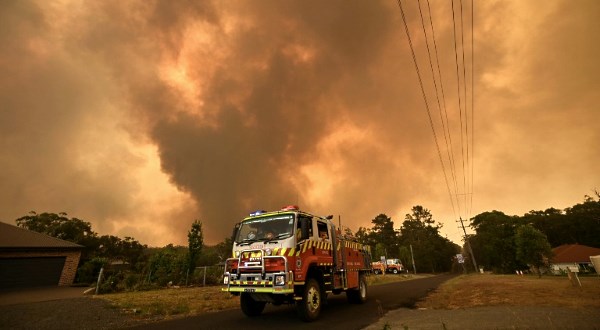
Melbourne (AFP) — Fire threatened three Melbourne suburbs Monday, with residents warned it was too late to flee and they must "act immediately to survive," as a heatwave fuelled Australia's deadly bushfire crisis.
Authorities declared a bushfire emergency as an out-of-control blaze bore down on homes in Australia's second-biggest city.
In Bundoora — just 16 kilometres north of the city centre and home to two major Australian university campuses — fire was "threatening homes and lives", Victoria Emergency said.
"You are in danger and need to act immediately to survive," the agency said in a message to residents. "The safest option is to take shelter indoors immediately. It is too late to leave."
Local media showed images of water bombers flying over the neighbourhoods and families dousing their homes with water hoses in the hope of halting the fire's spread.
It is the latest emergency in Australia's devastating summer fire season, which has been turbocharged by a prolonged drought and climate change.
Ten people have been killed, more than 1,000 homes destroyed and more than 3 million hectares — an area bigger than Belgium — have been scorched.
Conditions worsened on Friday with high winds and temperatures soaring across the country — reaching 47 degrees Celsius (117 Fahrenheit) in Western Australia and topping 40 degrees in every region — including the usually temperate island of Tasmania.
More than a dozen blazes are also raging in the East Gippsland countryside, where authorities said "quite a number" of the 30,000 tourists visiting the usually picturesque region had heeded calls to evacuate.
Some of the fires were burning so intensely that hundreds of firefighters were pulled back beyond a firefront estimated to stretch 1,000 kilometres (600 miles).
It was deemed "unsafe" for them to remain in bushland areas, Gippsland fire incident controller Ben Rankin said, describing the situation as "very intense."
'Too late to leave'
Authorities had warned tourists enjoying Australia's summer holidays in East Gippsland that the fires would cut off the last major road still open.
Victoria Emergency Management commissioner Andrew Crisp said residents and holiday makers still in the area faced being stranded as it was now "too late to leave", with his agency warning it was "not possible" to provide aid to all visitors in the area.
Neighbouring South Australia is also experiencing "catastrophic" fire conditions.
The Country Fire Service's Brenton Eden said it would be a "very dangerous" day for people in the state, with "dry" thunderstorms — which produce thunder and lightning but no rain — already sparking a number of fires including an emergency-level blaze on Kangaroo Island.
"Winds are gusting and unfortunately this is a dry lightning front that is going to move rapidly across South Australia," he told national broadcaster ABC.
Conditions were also expected to deteriorate in worst-hit New South Wales, where 100 fires were burning Monday morning including more than 40 uncontained.
Sydney and other major cities have been shrouded in toxic bushfire smoke haze for weeks, forcing children to play indoors and causing professional sporting events to be cancelled.
The capital Canberra has cancelled its New Year's Eve fireworks display due to a total fire ban in the Australia Capital Territory, while several regional towns have also followed suit.
A petition to cancel Sydney's famous New Year's Eve fireworks and use the money to fight bushfires ringing the city has topped 270,000 signatures, but officials say the show will go on.
Sydney has spent Aus$6.5 million ($4.5 million) on this year's fireworks display — funds that the Change.org petition argues would be better spent on supporting volunteer firefighters and farmers suffering through a brutal drought.






abdfee2f-b651-403b-acdb-2b2cc374b671352f3dcb-ed37-416e-bfee-df26126ede4b.jpg)
4e5d1dd0-7d87-4568-91a6-4558efd61318944dcb71-4930-4650-a5b2-01ec80695bd5.jpg)
4d7bd017-141a-4ca8-86e2-c70658e962b66596cbc9-705e-46ac-a179-1160af46fd53.png)
38716701-2b39-4f66-9e14-3ce0dee232f2288cf8b8-b7a0-445f-b7f6-fb3814b8ac6f.png)
f83a34f9-f4b4-4395-9d70-b12300708b94329f0425-9a8c-40eb-b929-894ff979e029.jpg)